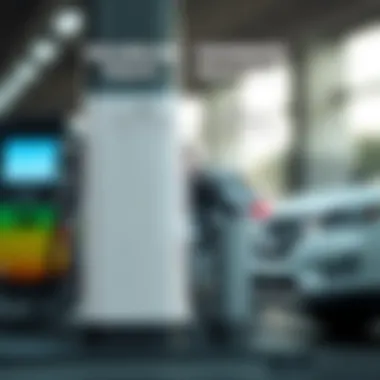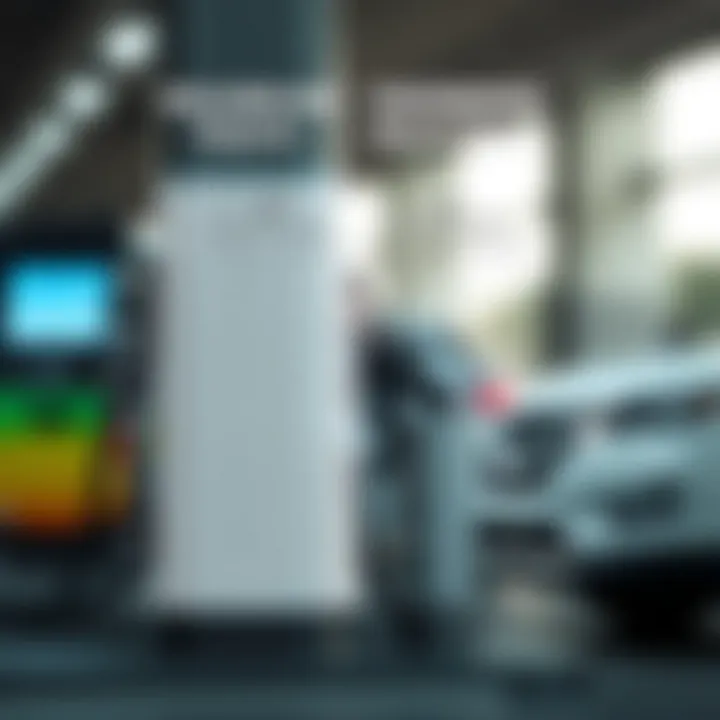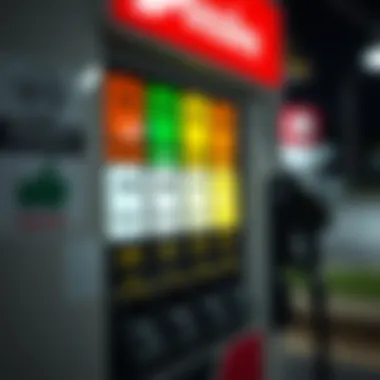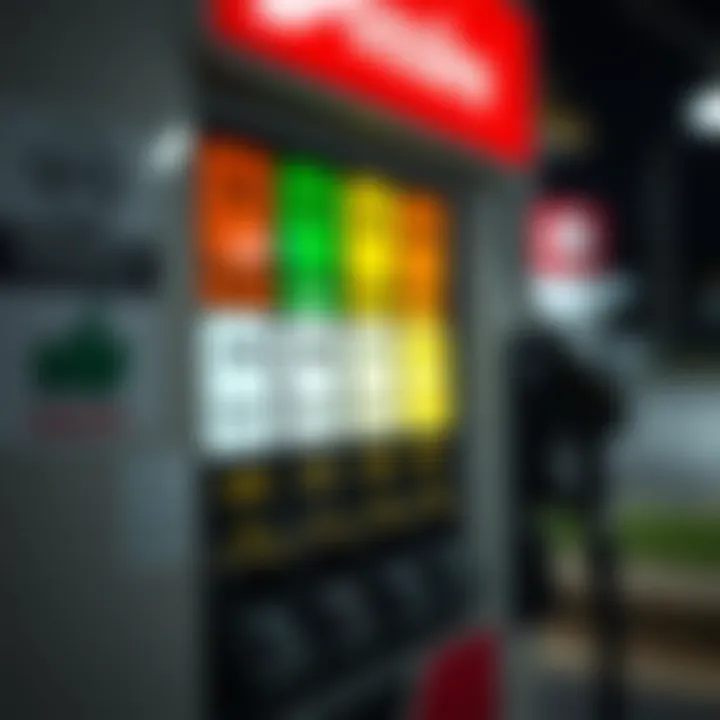Choosing the Right Gasoline for Your Nissan Rogue


Intro
Navigating the world of gasoline types for your Nissan Rogue is crucial for optimal performance and longevity of your vehicle. As automotive technology advances, the relationship between fuel quality and vehicle efficiency has become ever more intricate. Many Rogue owners may wonder, "What kind of gasoline should I be using?" The answer is more than just about avoiding engine knocks; it’s about understanding how various fuel grades impact your driving experience, cost considerations, and environmental responsibility.
The Nissan Rogue is engineered to deliver a reliable performance, but that performance can vary significantly depending on the gasoline you choose. Therefore, this guide aims to demystify the various gasoline types available for your Nissan Rogue. We will look at specifications, performance metrics, and environmental impacts, equipping current and future owners with essential knowledge.
Let’s explore these topics thoroughly to shed light on what fuel options best fit your Nissan Rogue's engine needs while considering factors that affect your overall driving experience.
Prelims to Nissan Rogue Fuel Requirements
Fuel selection is not just a trivial detail when it comes to vehicles like the Nissan Rogue. The right gasoline can significantly affect how the engine performs and how the vehicle behaves on the road. This section aims to peel back the layers on Nissan Rogue fuel requirements, exposing its complexities and the nuances surrounding them. By focusing on specific elements like fuel composition, grades, and the implications of these choices, we arm car enthusiasts and potential buyers with essential knowledge.
Significance of Fuel Choices
Choosing the right fuel is like picking the correct ingredients for a gourmet dish; it can either make or break the end result. Fuel choices will directly influence not only the performance but also the longevity of the Nissan Rogue's engine. For instance, using a lower-grade gasoline than what is recommended could lead to knocking in the engine, reducing its efficiency and power. On the flip side, using a higher grade than necessary might be an unnecessary expense without significant benefits. Therefore, understanding what type of fuel your vehicle demands is crucial—it’s about striking the right balance between cost, performance, and engine health.
Moreover, fuel decisions can impact the environment as well. The pressures today are high for automakers and consumers alike to consider not just performance but sustainability. Knowing fuel types and their consequences can aid in making more eco-friendly choices, a factor that’s increasingly on consumers' minds. Hence, the significance of fuel choices transcends the pocketbook; it examines the broader context of vehicle usage and environmental stewardship.
Overview of Fuel Types
When it pertains to the Nissan Rogue, the fuel landscape is somewhat diverse. It primarily operates on regular unleaded gasoline, but what does that entail? Let’s demystify the various fuel types one might encounter:
- Regular Unleaded Gasoline: This is the standard fuel for most vehicles, including the Nissan Rogue. Typically with an octane rating of 87, it offers a cost-effective option for daily driving needs.
- Premium Gasoline: Tested engines in higher-performance vehicles might benefit from premium fuel that has an octane rating of 91 or higher. However, for the Nissan Rogue, this is often not necessary.
- Ethanol Blends: More common in certain regions, ethanol-blended fuels contain a mix of gasoline and ethanol. The most prevalent type is E10, which is composed of 10% ethanol and 90% gasoline. This type of fuel can vary in its effects on engine performance and fuel economy.
Understanding these fuel types and their characteristics helps to navigate the ups and downs of fueling a Nissan Rogue. It's not just about filling the tank; it’s about knowing what’s going in it and how it impacts every ride you take. By doing so, you’ll ensure that your journey, whether short or long, is as smooth as possible.
Understanding Gasoline Types
Understanding the different types of gasoline is crucial for owners of the Nissan Rogue. The fuel you choose can significantly impact engine performance, fuel efficiency, and overall vehicle longevity. By diving into the specifics of gasoline types, you can make an informed decision that aligns with your driving habits and vehicle requirements.
Regular vs. Premium Gasoline
Defining Regular Gasoline
Regular gasoline typically has an octane rating of 87. This fuel type is commonly used and readily available. One of the key characteristics of regular gasoline is its affordability, making it a favorable option for many drivers. It provides adequate performance for most daily driving needs, particularly for vehicles like the Nissan Rogue, which is designed to run efficiently on this fuel grade. However, while regular gasoline is a cost-effective choice, it may not maximize engine performance in all scenarios, especially if the vehicle is under high stress or loaded heavily.
Defining Premium Gasoline
On the other hand, premium gasoline boasts a higher octane rating, usually around 91 or higher. This gasoline type can improve engine performance, particularly in higher-end models with turbocharged engines. A significant characteristic of premium gasoline is its capacity to resist knocking—an undesirable occurrence that can damage an engine in the long run. While the cost of premium gasoline is higher, drivers who desire optimal performance and engine responsiveness in their Nissan Rogue might find it worth the investment, especially in demanding driving conditions.
Key Differences in Composition
The differences in composition between regular and premium gasoline often come down to octane ratings and additives. Regular gasoline is more straightforward in terms of its chemical make-up, whereas premium gasoline contains enhanced additives designed to improve combustion and reduce harmful emissions. This distinction can greatly impact an owner's choice; premium gasoline may provide advantages in engine protection and fuel efficiency. However, the additional cost can be a drawback, leading some to question whether the benefits justify the expense in this case.
Ethanol Blends
Ethanol Content in Gasoline
Ethanol blends refer to a mix of gasoline and ethanol, usually up to 10% in E10 blends. Ethanol is derived from renewable resources such as corn and has gained popularity as an environmentally friendly alternative. One significant aspect of ethanol content lies in its ability to reduce greenhouse gas emissions compared to pure gasoline. For Nissan Rogue owners, understanding local availability of ethanol blends is crucial, as it can directly affect both engine performance and fuel costs.
Impacts on Engine Performance
Using ethanol blends can yield mixed results for engine performance. On one hand, ethanol provides some octane boosts that can enhance combustion efficiency; on the other, this type of fuel often contains less energy than standard gasoline, potentially leading to reduced fuel economy. For drivers seeking to optimize their Nissan Rogue's performance, it's essential to weigh these factors. Gas mileage may drop slightly with ethanol blends, yet the environmentally conscious choice can appeal to those looking to reduce their carbon footprint.
Availability of Ethanol Blended Fuels


The accessibility of ethanol-blended fuels varies greatly depending on geographic location. In some regions, E85—an 85% ethanol mix—might be available, but this choice is typically not recommended for the Nissan Rogue's standard engines, as it may cause performance issues. Thus, understanding fuel availability in your area is vital, as it can make a difference in both convenience and cost. Some drivers may find that sticking with standard gasoline yields more consistent results for their vehicles.
Nissan Rogue Engine Specifications
Understanding the engine specifications for the Nissan Rogue is crucial for owners and potential buyers alike. The engine is the heart of any vehicle, dictating not only performance but how well it responds to different types of fuel. Knowing the engine's capabilities enables one to make informed fuel choices that enhance both longevity and efficiency.
Engine Types in Different Models
Overview of Engine Options
The Nissan Rogue offers a variety of engine options, reflecting its adaptability to diverse driving needs. From the more traditional 2.5-liter four-cylinder to the turbocharged 1.5-liter engine found in newer models, each has its own characteristics that cater to different driving tastes. A turbo engine, for instance, tends to provide a punchier performance at low RPMs, giving that enjoyable kick during acceleration. This adaptability makes the Rogue an appealing choice for families and individuals alike who value versatility without sacrificing performance.
Alignment with Fuel Grades
Aligning the vehicle's engine type with the appropriate fuel grade is a key factor in achieving optimal performance. The Rogue's engines are generally designed to perform best on regular unleaded gasoline, which balances cost-saving and performance. However, those models equipped with the higher-output turbos may benefit from higher octane fuel, allowing for an enhanced driving experience. Such compatibility ensures that drivers can leverage their engine's full potential without an undue financial burden.
Recommended Fuel for Each Engine
Choosing the right fuel for each engine type is essential for maintaining engine health and performance. Typically, regular 87-octane fuel is recommended for standard models with the four-cylinder engine. In contrast, the turbo engine may see noticeable benefits when filled with 91-octane premium gasoline. The unique advantage here lies in the turbo engine's increased horsepower and torque when fed with the right grade, enhancing overall driving dynamics and efficiency.
Performance Requirements
Power Output
Power output might appear straightforward, but it’s fundamental in defining how the Rogue feels on the road. These engines, particularly the turbo versions, can produce impressive horsepower that translates into a more engaging driving experience. While the standard engine offers decent power for daily commuting, the turbo option caters to those who desire a bit more thrill. This emphasis on power output caters well to owners who often drive in demanding conditions, such as hilly terrains or during highway merge scenarios.
Efficiency Considerations
In an age where fuel efficiency is paramount, the Nissan Rogue doesn’t disappoint. The vehicle's engineering balances power with economy; the standard engines often yield impressive miles per gallon ratings, allowing owners to stretch their fuel dollar further. Meanwhile, eco-conscious drivers can opt for hybrid versions that push this efficiency envelope even farther, making the Rogue a fitting choice for environmentally aware consumers.
Impact of Fuel Grade on Performance
The fuel grade can significantly sway performance metrics, impacting acceleration, responsiveness, and overall driving enjoyment. Using premium gasoline in a high-performance Rogue variant can heighten responsiveness, allowing drivers to feel the difference in kick and smoothness during operation. However, it’s vital to consider personal driving habits; for many, the regular fuel suffices without noticeable drawbacks, maintaining the balance between cost and performance seamlessly.
Choosing the Right Gasoline
Selecting the right gasoline for your Nissan Rogue is no small potatoes. It plays a vital role in the vehicle's overall performance and longevity. Right out of the gate, the right fuel type can significantly impact your engine's efficiency, saving you dollars at the pump and in repairs down the road. Let’s dive deeper into the elements that make this choice critical.
Manufacturer Recommendations
Nissan’s Official Guidelines
Nissan's recommendations for fuel type serve as a roadmap for owners eager to keep their Rogue running smoothly. Typically, these guidelines advocate for using 87 octane gasoline, which is often referred to as regular fuel. The rationale behind this choice boils down to the engine’s design and performance specifications. By sticking to this recommendation, you’re ensuring that you’re not only maintaining optimum power output but also aligning with the manufacturer’s testing parameters.
One standout feature of Nissan’s guidelines is the clarity they provide in their literature. This clarity helps demystify the often confusing world of fuel grades for everyday drivers. Choosing the recommended fuel is a beneficial option because it lowers the risk of engine knocking, enhances fuel efficiency, and aligns with warranties that cover your engine. However, as with any guideline, individual circumstances can vary. Check your Rogue’s manual for specific recommendations as variations between models can shift those octane needs.
Potential Consequences of Deviating from Recommendations
Opting for a gasoline type that doesn’t fit Nissan's recommendations could lead to unfavorable outcomes. Engine knocking is one of the most immediate risks, and this occurs when fuel ignites prematurely within the cylinder. Such a situation might lead to serious engine damage over time. Moreover, using a higher octane fuel than necessary does not typically yield extra performance benefits and can result in unnecessary expenses.
The unique aspect of deviating from these guidelines lies in the potential long-term damage it can cause to your vehicle. Repair costs from issues stemming from improper fuel choices can mount quickly, making this a popular consideration for many owners, especially those on a tight budget. So, if you're thinking about using premium gasoline instead of regular, it’s worth weighing the real benefits against the potential financial hits.
Economic Considerations
This section tackles the nitty-gritty aspect of fuel choices—what's in your wallet? The cost of fuel isn’t just a fleeting consideration; it can have lasting implications on your overall car maintenance budget. Let's analyze both sides of the coin.


Cost-Benefit Analysis of Fuel Types
When it comes to the cost versus benefit of different fuel types, this analysis unveils some intriguing insights. Regular gasoline is generally more economical, but some drivers opt for premium, hoping for better mileage or enhanced performance. It’s essential to do a careful cost-benefit assessment. Yes, premium fuels may deliver a few extra horsepower, but often, the difference in performance is negligible for daily commuting needs.
One important point to consider is the long-term savings potential. Over the course of a year, sticking with regular gasoline can translate to significant savings on fuel costs. This implies that unless your driving habits suggest a real need for premium fuel, it might be better to keep your cash for other car expenses.
Long-Term Financial Impact on Vehicle Maintenance
Another layer to consider in the financial landscape of fuel choices is their long-term impact on vehicle maintenance. Using the right fuel for your Nissan Rogue not only preserves the engine but also enhances its lifespan. Regular maintenance checks and avoiding costly repairs due to improper fuel use contribute positively to the financial side of car ownership.
The long-term savings can be striking. When you weigh the costs of frequent repairs against consistent expenses of regular fuel, you'll often find that maintaining the recommended fuel standard ultimately helps your budget in the long run. This translates into a win-win: a healthier car and a happier bank account.
"Choosing the correct gasoline isn’t merely about fuel; it’s about securing your investment in the long run."
In summary, understanding the financial implications of your fuel choice for the Nissan Rogue transforms fuel selection from a mundane task into a critical decision. Keep these factors in mind as you pump gas next time; it’s more than just filling the tank.
Environmental Impact of Fuel Choices
Understanding the environmental ramifications of gasoline types is key in the conversation about the Nissan Rogue. Every gallon of fuel used comes with its own set of emissions and potential impact on our planet. Not only does the type of gasoline influence the vehicle’s performance and efficiency, it also affects air quality and contributes to climate change. This segment sheds light on how these choices matter for both current owners and future buyers.
Effects of Different Gasoline Types on Emissions
Understanding Emissions Standards
Emissions standards are guidelines imposed by governments to regulate the amount of pollutants that vehicles can emit. These laws aim to protect air quality and promote public health. For the Nissan Rogue, knowing these standards is crucial, as it determines compliance with legal obligations and helps owners choose fuel types that align with these regulations.
A significant characteristic of emissions standards is that they evolve over time. What was permissible a decade ago might not be today. This keeps manufacturers and car owners on their toes. It’s beneficial because it pushes advancements in cleaner technologies. However, not following these standards can result in hefty fines for manufacturers and could also mean reduced resale value for vehicles. Thus, aligning with emissions standards ensures not only legal compliance but also reflects a commitment to sustainability.
"Adhering to emissions standards is not just law, it's about being responsible stewards of the environment."
Comparing Regular and Premium Choices
When discussing the different fuel grades, one cannot overlook the variations in emissions between regular and premium gasoline. Regular fuel generally burns less cleanly than premium. In most cases, premium gasoline contains fewer impurities and additives, which can lead to reduced emissions, particularly for performance engines like that of the Nissan Rogue.
The distinction is significant: while premium fuel boasts higher octane levels and can improve engine efficiency, its benefits for emissions depend on the specific vehicle calibration. Owners need to weigh the benefits: can the higher cost of premium fuel come back to save on emissions-related expenses, or is regular gasoline still the better, more cost-effective choice? Knowing these aspects empowers Nissan Rogue owners to make informed decisions about their fuel choices.
Sustainability of Gasoline Options
Renewable Fuel Alternatives
Renewable fuel alternatives emerge as a topic of interest in the quest for sustainable automotive solutions. Fuels such as biodiesel and E85 fuel (which contains 85% ethanol) offer potential for reducing greenhouse gas emissions compared to traditional gasoline. These renewable options tap into biodegradable resources, making them attractive to those conscious about their carbon footprint.
One key feature of renewable fuels is that they can be produced domestically, reducing reliance on foreign oil and enhancing energy security. However, the switch also requires careful consideration regarding compatibility with existing engines and fuels. The Nissan Rogue, designed with specific fuel types in mind, may require engine adjustments or considerations if a driver wishes to experiment with these alternatives.
Impact on Fossil Fuel Dependency
The shift towards renewable fuel alternatives plays a critical role in lessening fossil fuel dependency. This transition is essential for supporting sustainable practices and aims to mitigate dependence on oil—a finite resource. By promoting the use of renewable fuels, the automotive industry can begin to lessen the overall environmental impacts caused by traditional gasoline.
However, the unique feature here lies in the initial investment and infrastructural changes required to support wider use of renewable fuels. It’s not just about filling up the tank; it also involves supporting broader societal changes in how energy is produced and consumed. For Nissan Rogue owners, understanding these shifts can prepare them for future fuel landscapes, paving the way for more sustainable vehicle operation.
Maintenance Considerations
When it comes to the longevity and optimal performance of your Nissan Rogue, maintenance considerations surrounding fuel choices are paramount. The type of gasoline you regularly pour into your tank doesn’t just affect how your engine runs; it also influences the overall condition of your vehicle’s fuel system. Proper maintenance can prevent costly repairs down the line and ensure that your ride remains smooth and efficient.
Fuel System Maintenance


Importance of Clean Fuel Systems
Keeping your fuel system clean is like giving your Nissan Rogue the best chance to perform well over time. A clean fuel system means that the fuel injectors, filters, and lines are free of dirt and debris that can clog them up. A clogged fuel system can lead to sluggish acceleration, poor fuel economy, and could even damage your engine if left unchecked.
The key characteristic of a clean fuel system is the efficient delivery of fuel to the engine, which is crucial for achieving optimal combustion. Using high-quality fuel can help maintain this cleanliness, as lower-quality options often contain additives that can leave residues. In the context of this article, maintaining a clean fuel system is a beneficial approach because it directly supports the performance and efficiency of the Nissan Rogue while minimizing unplanned repairs.
Unique features of clean fuel systems include:
- Preventative Maintenance: Regular cleaning can preempt more extensive issues and extend engine life.
- Cost Efficiency: Reducing the frequency of repairs can save money in the long run, aiding in budget management for Rogue owners.
Prevention of Fuel System Damage
Just as maintaining a clean fuel system is vital, taking steps to prevent damage is equally important. Damage to the fuel system can stem from various sources, including using the wrong type of gasoline or neglecting the condition of fuel injectors and filters. A major aspect of preventing fuel system damage involves understanding the vehicle's fueling needs and adhering to them.
The key characteristic of this prevention is the protection of crucial fuel components from wear and tear. By using recommended fuel types as specified by Nissan, you reduce the risk of encountering performance problems due to fuel grades incompatible with your Rogue's engine design. This focus can enhance your vehicle's reliability, making it a popular choice among conscientious car owners.
Noteworthy features pertaining to fuel system damage prevention include:
- Awareness of Fuel Quality: Knowing the makeup of your fuel and avoiding low-grade options can preempt significant repairs.
- Long-Term Reliability: A well-maintained system results not only in fewer issues but also contributes to an overall more reliable driving experience.
Long-Term Maintenance Tips
Long-term maintenance isn’t about just one aspect but involves a thorough approach to ensuring your Nissan Rogue remains in top shape over the years.
Monitoring Fuel Quality
One of the essentials in long-term vehicle maintenance is monitoring the quality of fuel you put in your Rogue. This aspect of maintenance is crucial; after all, not all gasoline is created equal. Regularly checking fuel quality may uncover issues with water contamination or sediment that could cause performance problems.
The key characteristic of monitoring fuel quality is the proactive identification of contaminants. This not only helps keep your fuel system cleaner but also supports better combustion, leading to improved efficiency. This practice is a beneficial measure as it fosters a more informed approach to fuel usage.
Unique features of fuel quality monitoring include:
- Enhanced Performance: Cleaner fuel ensures better engine response, reducing the likelihood of hesitation during acceleration.
- Fuel Economy: Keeping an eye on your fuel means that you can also potentially notice changes in mileage, alerting you to any underlying issues.
Best Practices for Fuel Storage
Lastly, proper fuel storage cannot be overlooked. If you tend to store gasoline for longer periods or fuel up during bulk purchases, understanding the best practices for fuel storage becomes essential. Storing gasoline in a way that mitigates breakdown is key to maintaining fuel effectiveness and engine health.
The key characteristic of best practices in fuel storage is to ensure the longevity of fuel quality. This is especially important if you’re not using your Nissan Rogue every day. Practicing good storage techniques means fueling up from clean containers and keeping gasoline in dark, cool environments to avoid degradation. This approach is particularly advantageous, as it helps avoid emergencies related to fuel issues.
Notable features of effective fuel storage include:
- Reduced Waste: Properly stored fuel remains usable for longer, cutting down the amount you spend on replacements.
- Safety Concerns: Good storage practices help to prevent risky situations related to fuel evaporation or contamination.
In sum, taking into account various maintenance considerations is indispensable for any Nissan Rogue owner. By focusing on clean fuel systems and preventing damage, while also keeping an eye on fuel quality and storage, you foster a healthy vehicle that performs at its best.
End
In summing up our exploration of gasoline types for the Nissan Rogue, it’s essential to consider several key elements that directly impact vehicle performance, efficiency, and overall durability. Knowing the right fuel to use is not just about satisfying your engine's needs; it extends to maintaining its health over time.
Recap of Key Points
- Fuel Choices Matter: The selection between regular and premium gasoline can significantly influence the vehicle’s performance. It’s crucial to stick to the manufacturer’s recommendations to avoid potential engine trouble.
- Ethanol Considerations: Fuels blended with ethanol present both advantages and disadvantages. Understanding how ethanol affects engine performance and fuel availability is vital for optimum driving.
- Maintenance is Key: Regular checks of your fuel system enhance longevity and ensure that your Nissan Rogue operates smoothly.
Final Thoughts on Fuel Selection
Ultimately, the choice of gasoline is a fundamental aspect of owning a Nissan Rogue. Factors such as fuel grade, cost, environmental impact, and engine efficiency are interlinked, making informed choices imperative. It’s not just about filling up your tank; it’s about sustaining the well-being of your vehicle.
Choosing the right gasoline type will lead to better fuel economy, reduced emissions, and fewer trips to the mechanic. Always stay informed and listen to the guidelines provided by Nissan. In doing so, you not only protect your vehicle's investment but you contribute to a more sustainable driving future.
“Sensible fuel choices lead to a smoother drive and a healthier engine.”
By following this comprehensive guide, you'll be well-prepared to make choices that are best for both your vehicle and the environment. Consider this information as your roadmap to successful fuel management, allowing your Nissan Rogue to perform at its peak for years to come.















